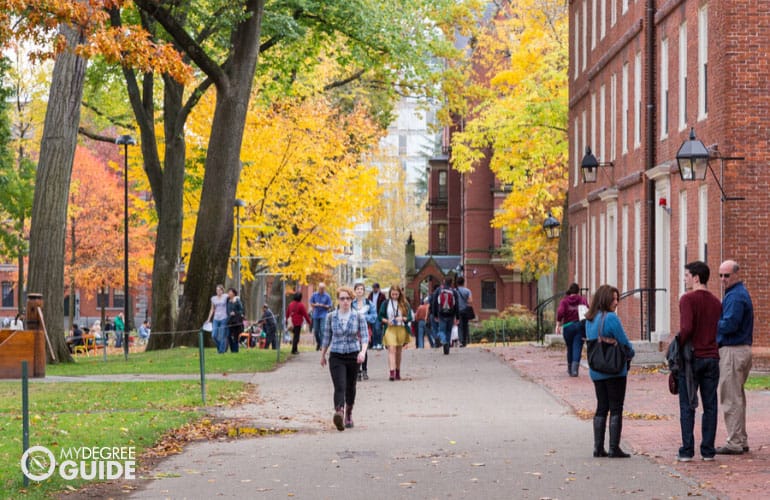Wondering about the different types of bachelor degrees and programs?
While it often matters more what classes you took and what your major area was than what actual degree you earned, the specific degree you list on your resume or job application could make a difference.

What’s important is discovering which degree is right for you and your future career path. With so many types of bachelor degrees available to students, it can become confusing and overwhelming to choose one.
Check out the brief descriptions below of the most common bachelor degrees available to you to get a sense of which would be the right fit.
Related Guide: 30 Best Majors in College
Editorial Listing ShortCode:
What Are the Different Types of Bachelor Degrees?
The U.S. Department of Education recognizes over 80 types of bachelor’s degrees.
- Bachelor of Architecture (B.Arch.)
- Bachelor of Arts (B.A.)
- Bachelor of Business (B.B.)
- Bachelor of Business Administration (B.B.A.)
- Bachelor of Science in Business (B.S.B.)
- Bachelor of Canon Law (B.C.L.)
- Bachelor of Computer Science (B.C.S.)
- Bachelor of Science in Computer Science (B.S.C.S.)
- Bachelor of Criminal Justice (B.C.J.)
- Bachelor of Science in Criminal Justice (B.S.C.J.)
- Bachelor of Divinity (B.D.)
- Bachelor of Education (B.Ed.)
- Bachelor of Science in Education (B.S.Ed.)
- Bachelor of Wireless Engineering (B.W.E.)
- Bachelor of Engineering (B.E./B.Eng.)
- Bachelor of Science in Engineering (B.S.E./B.S.EN.)
- Bachelor of Science in Aerospace Engineering (B.S.A.E.)
- Bachelor of Science in Agricultural Engineering (B.S.A.E.)
- Bachelor of Science in Biological Systems (B.S.B.S.)
- Bachelor of Science in Biosystems and Agricultural Engineering (B.S.B.A.E.)
- Bachelor of Science in Biological Engineering (B.S.B.E.)
- Bachelor of Biomedical Engineering (B.B.m.E.)
- Bachelor of Science in Biomedical Engineering (B.S.B.E./B.S.B.M.E.)
- Bachelor of Science in Chemical Engineering (B.S.Ch.E.)
- Bachelor of Science in Chemical and Biomolecular Engineering (B.S.Ch.B.E.)
- Bachelor of Science in Chemical and Materials Engineering (B.S.C.M.E.)
- Bachelor of Civil Engineering (B.C.E.)
- Bachelor of Science in Civil Engineering (B.S.C.E.)
- Bachelor of Science in Civil and Infrastructure Engineering (B.S.-C.I.E.)
- Bachelor of Computer Engineering (B.Comp.E.)
- Bachelor of Science in Computer Engineering (B.S.C.E./B.S.Cmp.E.)
- Bachelor of Science in Computer Science and Engineering (B.S.C.S.E.)
- Bachelor of Science in Electrical and Computer Engineering (B.S.E.C.E.)
- Bachelor of Electrical Engineering (B.E.E.)
- Bachelor of Science in Electrical Engineering (B.S.E.E.)
- Bachelor of Science in Engineering Management (B.S.E.Mgt.)
- Bachelor of Science in Environmental Engineering (B.S.En.E./B.S.Env.E.)
- Bachelor of Fiber Engineering (B.F.E.)
- Bachelor of Science in Industrial Engineering (B.S.I.E.)
- Bachelor of Science in Manufacturing Engineering (B.S.Mfg.E.)
- Bachelor of Science in Manufacturing Systems Engineering (B.S.M.S.E.)
- Bachelor of Science in Materials Science and Engineering (B.S.M.S.E.)
- Bachelor of Science in Materials Engineering (B.S.MA.E.)
- Bachelor of Mechanical Engineering (B.M.E.)
- Bachelor of Science in Mechanical Engineering (B.S.M.E.)
- Bachelor of Science in Metallurgical Engineering (B.S.Mt.E.)
- Bachelor of Science in Mining Engineering (B.S.MI.E.)
- Bachelor of Science in Systems (B.S.-SYST.)
- Bachelor of Software Engineering (B.S.W.E.)
- Bachelor of Science in Software Engineering (B.S.S.E.)
- Bachelor of Systems Engineering (B.S.E.)
- Bachelor of Science in Systems Engineering (B.S.S.E.)
- Bachelor of Engineering Technology (B.E.T.)
- Bachelor of Science in Engineering Technology (B.S.E.T.)
- Bachelor of Science in Civil Engineering Technology (B.S.C.E.T./B.S.Civ.E.T.)
- Bachelor of Science in Computer Engineering Technology (B.S.C.E.T.)
- Bachelor of Science in Construction Engineering Technology (B.S.Con.E.T.)
- Bachelor of Science in Drafting Design Technology (B.S.D.D.T.)
- Bachelor of Science in Electrical/Electronics Technology (B.S.E.T.)
- Bachelor of Science in Electrical Engineering Technology (B.S.E.E.T.)
- Bachelor of Science in Electro-Mechanical Engineering Technology (B.S.E.M.E.T.)
- Bachelor of Science in Mechanical Engineering Technology (B.S.M.E.T.)
- Bachelor of Fine Arts (B.F.A.)
- Bachelor of Forestry (B.F.)
- Bachelor of Science in Forest Research (B.S.For.Res.)
- Bachelor of Hebrew Letters (B.H.L.)
- Bachelor of Journalism (B.J.)
- Bachelor of Laws (LL.B.)
- Bachelor of Liberal Studies (B.L.S.)
- Bachelor of Literature (B.Lit.)
- Bachelor of Marine Science (B.M.S.)
- Bachelor of Music (B.M.)
- Bachelor of Nursing (B.N.)
- Bachelor of Science in Nursing (B.S.N.)
- Bachelor of Pharmacy (B.Pharm.)
- Bachelor of Philosophy (B.Phil.)
- Bachelor of Religious Education (B.R.E.)
- Bachelor of Science (B.S.)
- Bachelor of Science in Chemistry (B.S.Ch.)
- Bachelor of Technology (B.T./B.Tech.)
The National Center for Education Statistics notes that the 5 most popular bachelor’s programs include business, health professions, social sciences and history, engineering, and biological and biomedical sciences.
Each of these saw dramatic changes in growth over the past ten years as indicated below:
- Business majors — increased by 9%
- Health profession majors — increased by 94%
- Social sciences and history majors — dipped by 7%
- Engineering majors — increased by 74%
- Biological and biomedical sciences majors — increased by 40%

Most Commonly Conferred Bachelor Degrees
The National Center for Education Statistics does a great job of keeping track of every single degree conferred in the United States. If you love historical facts and statistics, you’ll probably enjoy their website filled with fun facts like this: only 99 Library Science bachelor degrees were conferred last year. I know you’ll sleep better at night knowing this fact. You’re welcome!
Of special interest to me are the statistics related to the most popular degrees like Business Administration. Five year ago, there were 363,799 business degrees awarded. This includes several types of business degrees ranging from business administration to project management. Trailing behind business in not-so-close second place are the health professions degrees: 216,228. Coming in third place, we have psychology with 117,557 bachelor’s degrees conferred.
| Bachelor Degrees Conferred | |
| Agriculture and natural resources | 40,458 |
| Architecture and related services | 8,806 |
| Area, ethnic, cultural, gender, and group studies | 7,724 |
| Biological and biomedical sciences | 121,191 |
| Business | 390,564 |
| Communication, journalism, and related programs | 92,528 |
| Communications technologies | 4,444 |
| Computer and information sciences | 88,633 |
| Education | 83,946 |
| Engineering | 126,687 |
| Engineering technologies | 19,620 |
| English language and literature/letters | 39,335 |
| Family and consumer sciences/human sciences | 23,962 |
| Foreign languages, literatures, and linguistics | 16,592 |
| Health professions and related programs | 251,355 |
| Homeland security, law enforcement, and firefighting | 57,339 |
| Legal professions and studies | 4,242 |
| Liberal arts and sciences, general studies, and humanities | 44,222 |
| Library science | 99 |
| Mathematics and statistics | 26,146 |
| Military technologies and applied sciences | 767 |
| Multi/interdisciplinary studies | 53,298 |
| Parks, recreation, leisure, and fitness studies | 53,546 |
| Philosophy and religious studies | 9,615 |
| Physical sciences and science technologies | 31,148 |
| Precision production | 47 |
| Psychology | 116,536 |
| Public administration and social services | 35,177 |
| Social sciences and history | 160,628 |
| Theology and religious vocations | 9,418 |
| Transportation and materials moving | 5,051 |
| Visual and performing arts | 89,730 |
| Total Degrees Conferred | 2,012,854 |
*Data provided by U.S Institute of Education Sciences, National Center for Education Statistics
In addition, you may want to reference some of the highest paying bachelor degrees as well.
Why Are There So Many Different Types of Bachelor’s Degrees?

Before diving into this question, it is best to define the difference between a degree vs major.
While most majors or fields of study fall within a single type of degree, there are some majors that fall within multiple types of bachelor degrees.
The overlap is usually seen between a Bachelor of Science degree and a Bachelor of Arts, the most common bachelor degrees that are offered and earned. For example, if you major in Biology, you can earn either a BS or a BA, depending on how many courses and which types of courses you complete. If you major in Education, you may earn a BA, a BS or a B.Ed. (Bachelor of Education).
The difference between a college and university in regards to the degree name doesn’t connote any real difference in what knowledge is acquired by completing that degree.
It’s often more helpful and revealing to check out which courses and concentrations are offered within that degree and major, rather than assuming something from the degree name. As in the Education example from above, some programs offer a B.Ed., while some only offer a BA or BS with an Education major.
If the courses you completed are important enough, most graduate programs or employers will check your transcript for those specific courses.
These various degrees are offered at a variety of institutions. At a small liberal arts school, you can earn a BS, a BA, a BFA or a specialty degree. The same can be said for a large land grant institution. It is very rare for an institution to only offer one or two types of degrees to its students.
Choose your degree based on your interests, the possibilities of majors, and the specific department within which you’ll be studying, rather than by simply choosing a college or university.
The Most Common Types of Bachelor’s Degrees

With over 80 recognized types of bachelor’s degrees floating around, it’s enough to make your head spin.
Instead of going over each and every one of even the most obscure bachelor’s, I’m going to focus on the most commonly awarded bachelor degree programs in the USA:
- Bachelor of Science
- Bachelor of Arts
Yep. You got it. Out of dozens of bachelor’s degrees awarded across the nation, we can safely narrow down the list to the top 2 most commonly awarded bachelors.
Let’s dive in.
Bachelor of Science (BS)
A BS is one of the most common types of bachelor degrees that college students earn. If you plan to pursue a field in the sciences, this is the degree you’ll most likely encounter on your search for a program. Some of the majors within this degree include:
- Biology
- Chemistry
- Mathematics
- Physics
- Computer Science
- Business
- Nursing
- Engineering
- Economics
- Nutrition
- Natural Sciences
- Education (Science Track)
Some of these majors have more stringent requirements than others. Engineering, for example, is known for its rigorous curriculum. In fact, many engineering students have difficulty graduating in four years without taking summer courses.
The University of California at Davis discovered that students in the engineering major were more likely to complete their degree within five years than students in other schools and majors were. Those other non-engineering students were more likely to complete their degree within just four years.
Just because you choose a BS doesn’t mean you’ll be required to complete the same number of courses as everyone else who is pursuing a BS. Each department and major determines what requirements must be met before a degree can be awarded.
Many BS degree programs require multiple lab classes, so be prepared to take courses that will require lab hours. If you complete your degree online, these lab hours may be simulated in other ways through virtual activities online, but the knowledge and skills attained from those labs will still be required.
Bachelor of Arts (BA)

Another extremely popular degree among the types of bachelor degrees offered is the BA. This degree usually focuses more on subjects within the humanities and human sciences, but still includes some of the natural sciences as well. Possible majors within this degree include:
- English
- History
- Communication
- Human and Family Development
- Education
- Economics
- Earth Science
- Foreign Languages
- Fashion Merchandising
- Anthropology
- Geology
- Interior Design
- Philosophy
- Psychology
- Political Science
- Sociology
As you can see, there is some overlap with a few majors on the BS list. At many institutions, you can earn either a BS or a BA in subjects like Economics and certain natural sciences like Geology.
The distinction usually has to do with additional course requirements, with the BS typically requiring more math or science courses than the BA. Sometimes, however, the distinction has to do with the degree the institution is choosing to offer.
For example, one college or university might only offer a BA in Education and not the BS track for those wishing to teach science at the elementary or secondary levels.
This doesn’t necessarily mean that you won’t be as prepared for your future career, but you should investigate and confirm that the classes you need for adequate training will be offered within the BA program.
Bachelor of Fine Arts (BFA)
Although the BFA isn’t the most popular bachelor degree type conferred, it’s worth noting if you want to pursue a degree in fine arts.
If you’re creative and artistic, a BFA may be a suitable fit for you among the types of bachelor degrees offered. A degree in fine arts conveys a commitment to the creation of art and aesthetics. The majors in this degree include:
- Creative Writing
- Dance
- Ceramics
- Art (Drawing, Painting, etc.)
- Photography
- Printmaking
- Graphic Design
These majors usually require a portfolio element of assessment in which you present your cumulative work in order to complete your degree. A BFA is very hands-on and often requires a natural skill base before getting started.
If you can’t draw a straight line with a ruler, you might not be cut out for a BFA, but if you have some artistic inclination that needs to be honed, you can probably do so through a BFA program.
Other Specialty Bachelor Degrees
Some institutions choose to label or name their degrees slightly differently than the more well-known labels explored here. If you find these types of degrees, don’t be scared of them.
Chances are, these degrees are quite similar in nature and requirements as a BS, BA, or BFA degree. Here are some specialty degrees you may encounter when searching the types of bachelor degrees that are out there:
- Bachelor of Education (B.Ed.)
- Bachelor of Engineering (B.Eng.)
- Bachelor of Computer Science (BCS)
- Bachelor of Social Work (BSW)
- Bachelor of Nursing (BN)
There are other specialty degrees, too, but those above are the most common. It doesn’t necessarily mean it’s a better degree if you obtain a BN instead of a BS with a Nursing major. What matters and the program’s reputation, accreditation, and course offerings. Those factors will best prepare you for your future career field rather than the name of your degree.
If a college or university offers one of these specialty degrees, it probably won’t offer that major within another degree (like a BA or a BS), though this isn’t always the case. If the college or university you choose offers both types of degrees for your major, research closely what the differences are and then determine which is the best degree for you to pursue.
For example, you may only have the option to concentrate in a specialty area within one type of degree and not within another. These factors should all determine which degree is right for you.
Can you get two bachelor degrees at the same time? Yes, it is possible to obtain two bachelor’s degrees at the same time. Earning two bachelors degrees simultaneously is feasible, but it often requires careful planning and fulfilling the requirements of each program, which may extend the overall duration of your studies.
Online Bachelor Degrees

Almost every single one of the degrees and majors discussed here can be earned online. Many bachelor’s degree online programs also offer accelerated formats for a variety of majors. If you want to avoid the extra time it seems to take engineering students to complete their degree, for example, choosing an accelerated format might help you do so.
Through an online program, you can complete course requirements from the comfort of your own home and on your own schedule. This is particularly valuable if you live far from a college or university and can’t move or if you have a job or other responsibilities that prevent you from attending classes during the week.
When searching online programs, you’ll encounter the same types of issues with the names and types of degrees offered. Some online programs may only offer a BA in the major you desire to pursue, some may offer a BA and a BS, and some may only offer a BS. Again, it’s essential that you investigate the classes and requirements for each degree.
Relying on the degree name alone could send you down a path that doesn’t suit your interests or future career goals.
